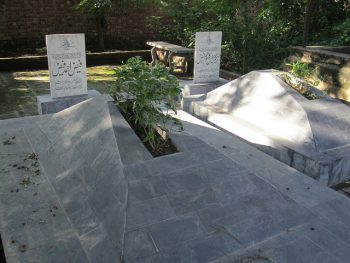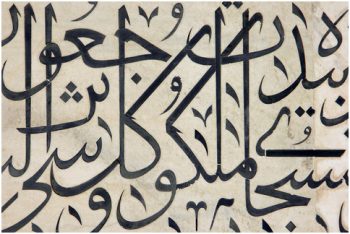Faiz Ahmed Faiz: The Dawn of Freedom Posted by Rachael on Nov 11, 2017 in Hindi Language, Uncategorized
This week, I’ll discuss another major writer in the Hindi-Urdu literary world: Faiz Ahmed Faiz (फ़ैज़ अहमद फ़ैज़). Faiz (1911-1984) was an intellectual who is known mostly for his poetry, which is often revolutionary in tenor. Today, he is considered one of the finest writers in the Hindi-Urdu literary sphere.
He wrote mainly in Urdu, although he also composed poetry in Punjabi. During his lifetime, he was nominated for the Nobel Prize in Literature and even received the Lenin Peace Prize, conferred by the Soviet Union, in 1962. He was greatly admired and much read in the former Soviet Union; because of this, most of his writings have been translated into Russian. Additionally, he was a member of the Progressive Writers’ Movement and considered himself a socialist. This political position caused Faiz no shortage of troubles in the relatively conservative atmosphere of Pakistan, to which he immigrated after the partition of India and Pakistan in 1947. Although he came into conflict with the Pakistani government during his lifetime, he was honored after his death with the nation’s highest civil award, Nishan-e-Imtiaz, in 1990.
Faiz was born in Punjab, British India, and was part of an intellectual and literary family who, while devout Muslims, raised him in the secular tradition of Islam. Later, Faiz would declare himself an agnostic, yet he always considered himself, culturally and linguistically, to belong to the Muslim community. Interestingly, Faiz was also well-acquainted with English literature, even earning a Master’s degree in English literature as well as serving as a lecturer of English and British Literature for a time at the Muhammadan Anglo-Oriental College in Amritsar (in present-day Punjab, India). In his work, including the poem I have translated below, the impress of his worldview can be clearly seen: Faiz’s work speaks strongly against the oppressions of government, particularly military dictatorships, the tyranny of the wealthy and powerful and the corruption of ideals.
The Dawn of Freedom/सुबह-ए-आज़ादी/صبح_آزادی
Composed in August, 1947 (on the occasion of the partition of India and Pakistan)
|
Urdu Text |
English Translation and Roman Transliteration |
Hindi Text |
|
یہ داغ داغ اجالا، یہ شب گزیدہ_سحر
|
These stains/scars illuminated by daybreak (lit. these illuminated stains/scars), this morning injured by night, (ye daag daag ujaalaa, yah shab-gazeedaa seher) |
ये दाग़ दाग़ उजाला, यह शब-गज़ीदा सहर |
|
وہ انتظار تھا جس کا یہ سحر تو نہیں
|
This is not the dawn we waited for. (voh intizaar thaa jis kaa yah seher to nahin) |
वह इंतिज़ार था जिस का यह सहर तो नहीं |
|
یہ وہ سحر یو نہیں جس کی آرذو لے کر
|
This is not that dawn for which our friends set out, (yah voh seher to nahin jis ki aarzoo le kar) |
यह वह सहर तो नहीं जिस की आरज़ू ले कर |
|
چلے تھے یار کہ مل جاےگی کہیں نہ کہیں
|
Hoping to find somewhere along the way. (chale the yaar ki mil jaayegi kahin na kahin) |
चले थे यार कि मिल जाएगी कहीं न कहीं |
ﷺ |
||
|
فلک کے دشت میں تاروں کی آخری منزل
|
In their weary journey across the heavens, it is the stars’ final destination. (lit. in the forest of the heavens, it is the stars’ last destination) (falak ke dasht me taaron ki aakhiri manzil)
|
फ़लक के दश्त में तारों की आख़िरी मंज़िल |
|
کہیں تو ہوگا شب _ سست موج کا ساحل
|
At some point, the languid wave of night must reach the shore. (kahin to hogaa shab-e-sust-mauj kaa saahil |
कहीं तो होगा शब-ए-सुस्त- मौज का शाहिल |
|
کہیں تو جا کے رکیگا سفینہ_غم دل
|
Somewhere, the heart’s ship of sorrows must find its harbor. (kahin to jaa ke rukegaa safeenah-e-gam dil) |
कहीं तो जा के रुकेगा सफ़ीना-ए-ग़म दिल |
ﷺ |
||
|
جواں لہو کی پر اسرار شاہراہوں سے
|
Traveling on the mysterious highways of youthful blood, (javaan lahu ki pur-asraar shah-raahon se) |
जवान लहू की पुर-असरार शाह-राहों से |
|
چلے جو یار تو دامن پے کتنے ہاتھ پڑے
|
How many of those friends clutched the skirts of temptation/beauty. (chale jo yaar to daaman pe kitne haath pare) |
चले जो यार तो दामन पे कितने हाथ पड़े |
|
دیار _حسن کی بے صبر خواب گاہوں سے
|
From the restless bedchambers of beauty’s domain, (dayaar-e-husn ki be-sabr khvaab-gaahon se) |
दयार-ए-हुस्न की बे-सब्र ख़्वाब-गाहों से |
|
پکارتی رہیں باہیں بدن بلاتے رہے
|
Arms kept calling out, bodies kept beckoning. (pukaarti rahin bahen, badan bulaate rahe) |
पुकारती रहीं बाहें बदन बुलाते रहे |
|
بہت عزیز تھی لیکن رخ_سحر کی لگن
|
But our affection for the face of dawn was very dear (to us). (bahut azeez thi, lekin rukh-e-seher ki lagan) |
बहुत अज़ीज़ थी, लेकिन रुख़-ए-सहर की लगन |
|
بہت قریں تھاحسینان _ نور کا دامن
|
(And) the petticoats of shining beauties were within reach. (bahut qarin thaa hasinaan-e-noor kaa daaman) |
बहुत क़रीं था हसीनान-ए-नूर का दामन |
|
سبک سبک تھی تمنا دبی دبی تھی تھکن
|
Our desires were delicate, our fatigue was subdued. (subuk subuk thi tamanna, dabi dabi thi thakan) |
सुबुक सुबुक थी तमन्ना, दबी दबी थी थकन |
|
سنا ہے ہو بھی چکا ہے فراق_ظلمت_و_نور |
I have heard even of the separation of light and darkness. (sunaa hai ho bhi chukaa hai firaak-e-zulmat-o-noor) |
सुना है हो भी चुका है फ़िराक़-ए-ज़ुल्मत-ओ-नूर |
|
سنا ہے ہو بھی چکا ہے وصال_منزل_و_گام |
I have even heard of the union of the journey and the destination. (sunaa hai ho bhi chukaa hai visaal-e-manzil-o-gaam) |
सुना है हो भी चुका है विसाल-ए-मंज़िल-ओ-गाम |
|
بدل چکا ہے بہت اہل_داد کا دستور |
The customs of the suffering people have changed completely: (badal chukaa hai bahut ehel-e-dard kaa dastoor) |
बदल चुका है बहुत अहल-ए-दर्द का दस्तूर |
|
نشاط_وصل حالال و عذاب_ہجر حرام |
The ecstasy of union has become sacred, while the torture of separation has become blasphemous. (nashaat-e-vasl halaal o azaab-e-hijr haraam) |
नशात-ए-वस्ल हलाल ओ अज़ाब-ए-हिज्र हराम |
ﷺ |
||
|
جگر کی آگ نظر کی امںگ دل کی جلن |
The fire of the spirit, the passion of the gaze, the envy/burning of the heart, (jigar ki aag, nazar ki umang, dil ki jalan) |
जिगर की आग, नज़र की उमंग, दिल की जलन |
|
کسی پے چارہٴ_ہجراں کا کچ اشر ہی نہیں |
Not one is touched by (lit. affected by) the cure for separation. (kisi pe chaaraa-e-hijraa (hijraan) kaa kuch asar hi nahin) |
किसी पे चारा-ए-हिज्राँ (या हिज्रान) का कुछ असर ही नहीं |
|
کہاں سے آیٴ نگار_صبا کدھر کو گیٴ |
From whence came the pictures of the east wind, and where did they go. (kahan se aayi nigaar-e-sabaa, kidhar ko gayi) |
कहाँ से आयी निगार-ए-सबा, किधर को गयी |
|
ابھی چراغ_سر_رہ کو کچ خبر ہی نہیں |
Now, (we) are oblivious to the lamp guiding the way. (abhi charaag-e-sar-e-rah ko kuch khabar hi nahin) |
अभी चराग़-ए-सर-ए-रह को कुछ ख़बर ही नहीं |
|
ابھی گرانیٴ_شب میں کمی نہیں آیٴ |
Now, there is no limit to night’s unbearable weight. (abhi giraani-e-shab me kami nahin aayi) |
अभी गिरानी-ए-शब में कमी नहीं आयी |
|
نجات_دیدہ_و_دل کی گھڑی نہیں آیٴ |
The moment of complete salvation has not (yet) come. (najaat-e-deedaa-o-dil ghari nahin aayi) |
नजात-ए-दीदा-ओ-दिल घड़ी नहीं आयी |
|
چلے چلو کہ وہ منزل ابھی نہیں آیٴ |
Come, let’s go, we have not yet reached our destination. (chale chalo ki voh manzil abhi nahin aayi) |
चले चलो कि वह मंज़िल अभी नहीं आयी |

Build vocabulary, practice pronunciation, and more with Transparent Language Online. Available anytime, anywhere, on any device.






